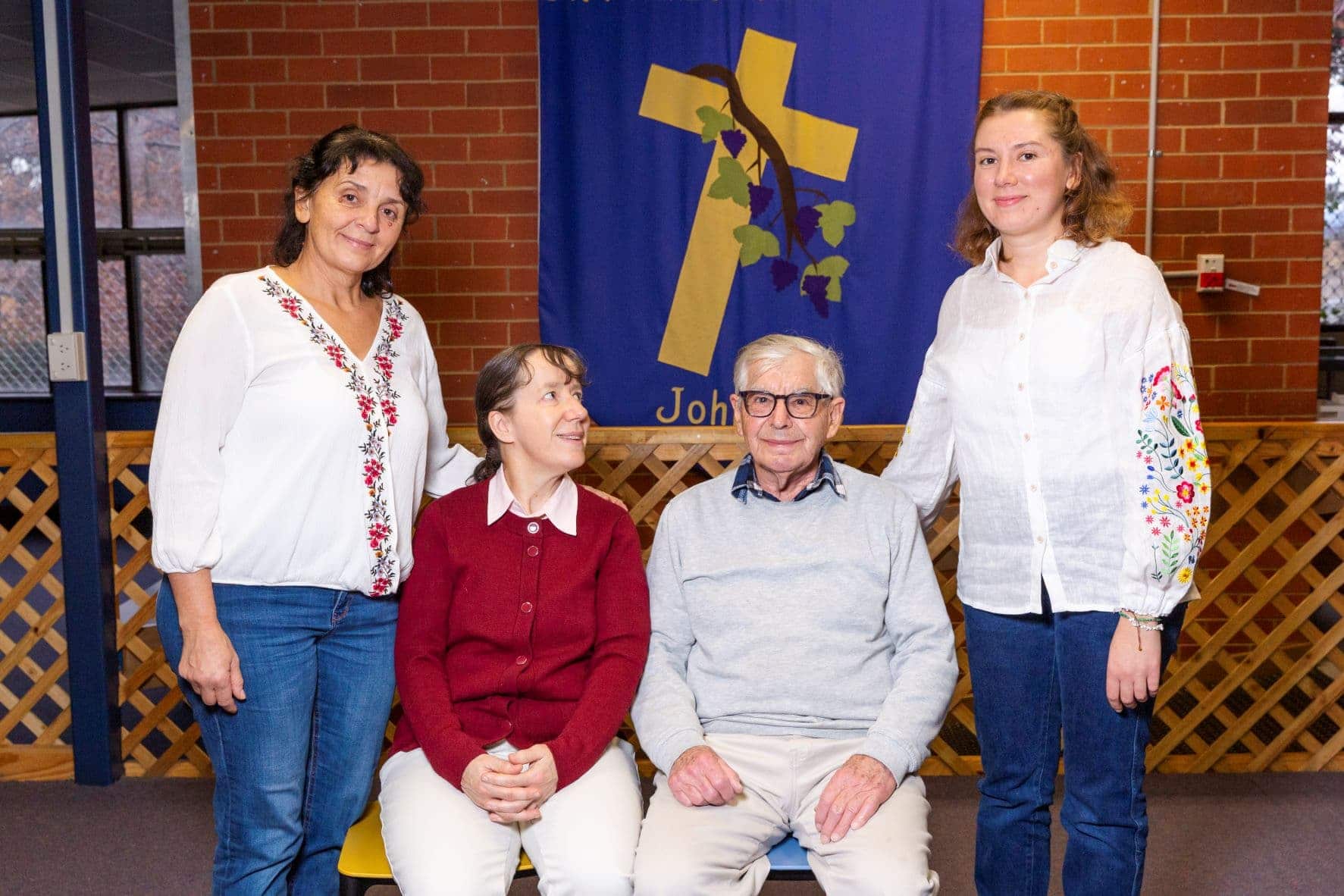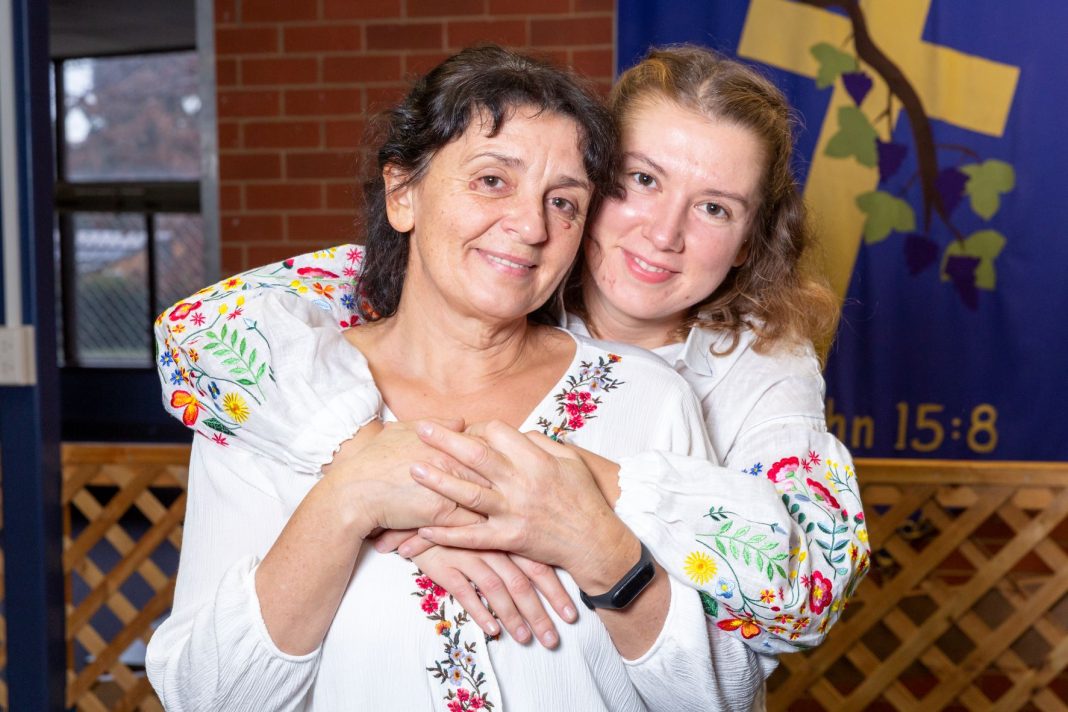“It was hard to accept the war because we knew we would not have the same life again. Now, there is life before the war, life during the war, and, I think, after the war.” – Yuliya, Ukrainian refugee.

Patrons of St Paul’s Ginninderra Anglican Church have opened their home and community to a Ukrainian mother and daughter, who were left refugees following the holiday from hell.
Before the war, 32-year-old Yuliya was a business trainer in IT, living in Kyiv, two hours from her hometown.
Her mother, 55-year-old Svetlana owned a small family store with her husband, Yuliya’s father.
Since Yuliya worked remotely, she was frequently able to travel the world. “I like to travel. My dad, he liked to be at home. So usually, my mum would come to me, so we could spend some time together.”
“In Ukraine, it’s very cold in the winter, so I decided to stay in Sri Lanka for a few months. For my mum’s birthday, I bought her tickets to come to Sri Lanka for three weeks.”
“We had heard news about Russian troops near the borders of Ukraine. It wasn’t new. Sometimes Russian troops had training near Ukraine borders.
“Last year, nobody could’ve even imagined that Russia could start war. Nobody took it seriously. Ukrainians had many relatives in Russia. My mother’s family has relatives in Russia. We couldn’t imagine that this could happen.”
“I remember the moment,” said Yuliya. “I remember that we were near the swimming pool. It was a nice day, it was warm. It was early morning, 9 o’clock in Sri Lanka, but 6.30 in the morning in Kyiv.
“The rocket came at 6am. Russia bombed Kyiv first.” Yuliya clutched her mother’s hand while she spoke, as Svetlana, not able to speak English but able to understand, breathed through tears.
“I remember the reading the news like, ‘oh my god… the war started,’” said Yuliya shakily.
“We were in shock. Everybody knows that if a war starts, it doesn’t end in a few days. It was one of the hardest days to accept; The war started, and it will change everything.
“The first month was very hard, because we couldn’t sleep. We just read the news, all the time. Everybody tried to escape from Ukraine, from Kyiv, from the bombs, and we were in Sri Lanka.”
“At first, we thought maybe we could stay there, but then Sri Lanka’s economic crisis started. Sometimes it would be 20 hours without electricity, and it became impossible for me to work,” said Yuliya.
“I understood that if something happened in Sri Lanka, we would not have a chance to survive, because Ukraine could not help us. It was better to go somewhere else.”
Yuliya and her mother had to make an important decision, quickly. “Of course, it would be better for us to go to Europe, because it’s a culture that we know and it’s near Ukraine.
“But if the war started in Ukraine, tomorrow it could be in Europe.”
“We needed to go somewhere not bordering Russia, somewhere very far. So, we started looking to Australia. Here, the Ukrainian community is strong in Sydney and Melbourne.”
From Melbourne’s Ukrainian community, Anna Golovchenko reached out to the mother and daughter, offering a lifeline.
Meanwhile, local woman Lauren and her father David, a patron of St Paul’s, found a website that was connecting Ukrainian refugees with volunteers opening their homes to them.
Lauren applied to offer lodging in their Spence home and, 10 days later, Yuliya and Svetlana moved into the spare bedrooms. They arrived in Australia on 28 April.
Back in Ukraine, Yuliya’s father uses their manchester shop and the family’s own savings to support nine refugees living in their home.
“Dad says it’s enough, but in the house, there are currently two families. We asked other relatives if maybe they could take some of these people in, but they don’t have food for them, they don’t want to take responsibility for other families.”
His wife and daughter have stayed with Lauren and David in Spence for two months now.
“Every day it’s worse and worse news; Very big and strong cities, now bombed,” Yuliya said.
“Now, we just check the news in the morning and the evening, because you can go mad checking the news all the time.”
A few weeks ago, David brought Yuliya and Svetlana to the church’s community lunch, where they shared their story. The churchgoers suggested a fundraiser to help Yuliya’s father.
“My mum cooked family meals, like Borscht. We didn’t expect there would be 50 people. While we were cooking, I looked up and suddenly everything was yellow and blue.
“Somebody had decorated everything. It was beautiful. There were even biscuits in the shape of sunflowers (the national flower of Ukraine).
“We were worried because we thought people wouldn’t like our food, but everybody was very thankful. My mum was happy because there were so many people.”
St Paul’s raised almost $3,000 for Yuliya’s father and the nine refugees in their home.
Soon, Yuliya and Svetlana will be leaving Canberra, moving to Sydney for a job opportunity for Yuliya. Lauren will be driving them to their new home – a space of their very own.
“It’s not easy to take strangers into your home, but Lauren did everything for us and now we feel that we have relatives here,” Yuliya said.
“We have our bedrooms; my mum has her own kitchen where she can cook Ukrainian food. She is happy to have something to do, and not just think about what’s happening in Ukraine.”
Then, Svetlana broke the language barrier to proclaim that Lauren and David are “very nice”. She went on to deliver a special message, translated by her daughter:
“When I learn English, I will come to Canberra and talk with you all. I will say thank you to everybody, on my own, without needing my daughter’s help.”
“We need to help Ukrainians now, the ones who decided to fight, who decided to stay in their home,” Yuliya said.
“I’ve seen that even small support to help refugees to survive here is very important. Just to hug, just to feel.”
To offer support to Ukrainian refugees, visit ukrainians.org.au/welcome/
Canberra Daily would love to hear from you about a story idea in the Canberra and surrounding region. Click here to submit a news tip.



